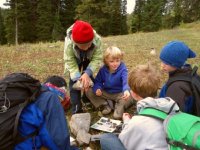Technology, PBL, and Place-Based Education
A project- and placed-based learning school learns to use cutting-edge technology in the classroom while maintaining a close relationship to its stunning natural setting.
Teton Valley Community School (TVCS), a pre-K through sixth grade school in Victor, Idaho, has embraced project- and place-based education since its inception 13 years ago. Our valley and its people are fundamental parts in our curriculum-integrated projects. This hands-on learning prepares students for 21st century citizenship, teaching skills like communication, collaboration, and critical thinking. However, we sometimes struggle to add technology into the equation. We recognize that in this fast-paced world, students must be educated in the latest technology, but how can we do this without losing their connection to place and their appreciation for the natural world?
Last year, two classes at TVCS found a way to combine place-based projects with cutting-edge technology, proving that the two are not mutually exclusive.
The Spark: Cool GPS Technology
On an early September field trip in 2013, TVCS third through sixth grade students spent the day exploring Grand Teton National Park with a GPS device that sits on the dashboard and talks about the passing landscape. For children growing up surrounded by ecological thinking and spectacular landscapes, this field trip could have been mundane, but the GPS unit brought the experience to life. What a cool way to learn about nature! On the way home, the buzz from the students was, "We need a guide like this for Teton Valley!"
Teachers at TVCS use student-driven questions to build projects, keeping students engaged while teachers facilitate the process. Many projects have a driving question that strives to fulfill a community need, as stewardship and service learning are integral to our mission. For this project, students aimed for an end result that would impact our community and beyond:
During the planning phase, it became clear that both place-based research and technological know-how would be instrumental to completing this project.
The Research: Mining Our Community
To teach visitors about our valley, first the students would need to become experts themselves. This was a challenge because Teton Valley is not small! How would the students decide what to include in their technological tour? They went out into the valley to explore favorite spots and figure out what visitors might be most excited about learning. Thinking critically and sharing special locations with each other instilled a sense of pride. They analyzed all aspects of our valley, and landed upon two topics that make Teton Valley unique: our history and the underlying geology.
After deciding on these focus areas, the classes had to determine how they would gather this knowledge. Traditionally at TVCS, projects take advantage of the people, resources, and landscape around us. With teacher guidance, students identified community experts such as geologists and historians, and local museums like the Museum of the Mountain Man and the Teton Valley Museum to do their research. After numerous meetings and visits, extensive note taking, and writing and revising, the students were finally able to share their knowledge and recorded "stories" tied to different places all over the valley.
The Partnership: Local Mobile App Company
The students wanted to use technology to share their stories so that visitors would be just as excited to learn as they had been during their initial field trip with the GPS device. During the research phase, students marked their teaching locations throughout the valley with GPS points. Using Google Earth, they learned how to connect these points with their recorded audio and the photographs they took and located online. They now had a comprehensive "tour." However, the final goal of sharing this research with the public had yet to be realized.
After some research, the teachers discovered TravelStorysGPS™, an organization based in Jackson Hole, Wyoming that partners with locals to create mobile app "tours." TravelStorysGPS agreed to publish our student-written tour! Now, people from all over the world can download and listen to the stories written and recorded by TVCS third through sixth grade students.
The Product: Teton Valley Student Tour
When students saw the app for the first time, their faces brimmed with pride and excitement. Their product and their learning came to life when they realized that people everywhere could listen to the stories they told about their home. This project also forged a pioneering relationship between TVCS and TravelStorysGPS. We are now working together to create a curriculum and share our project with other schools who may be interested in a similar endeavor.
TravelStorysGPS founder and CEO, Story Clark, spoke highly of the final product and the partnership between the organizations:
During this project, we learned that it's possible to use cutting-edge technology in the classroom while maintaining a close relationship to place and the natural world. We'd love to hear how other schools are integrating technology and place in their classrooms!
